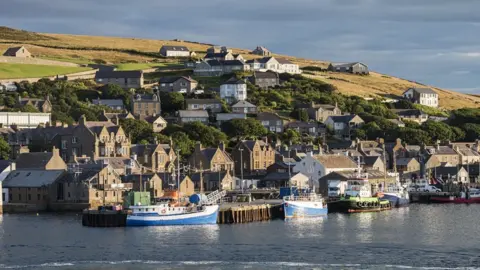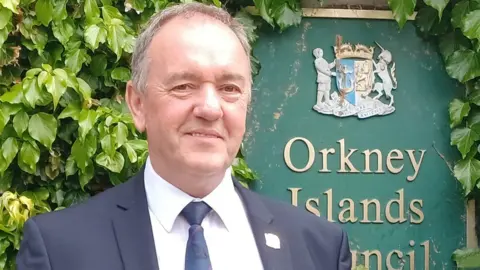Orkney votes to explore 'alternative governance'
 Getty Images
Getty ImagesOrkney councillors have voted to investigate alternative methods of governance amid deep frustrations over funding and opportunities.
Council leader James Stockan said the islands had been "held down" and accused the Scottish and UK governments of discrimination.
His motion led to media speculation that Orkney could leave the UK or become a self-governing territory of Norway.
It was supported by 15 votes to six.
It means council officers have been asked to publish a report to Orkney's chief executive on options of governance.
This includes looking at the "Nordic connections" of the archipelago and crown dependencies such as Jersey and Guernsey.
A further change which would see the revival of a consultative group on constitutional reform for the islands was accepted without the need for a vote.
On Monday, the prime minister's spokesperson rejected the suggestion the islands could loosen its ties with the union.
Mr Stockan urged councillors to back his idea to find new ways to get greater financial security and economic opportunities for Orcadians.
Speaking to councillors on Tuesday, he said the motion was "not about us joining Norway".
He added: "I say it's time for government to take us seriously and I say it's time for us to look at all the options we've got.
"There is a far bigger suite of options here - this could even be that we could get our money direct from the Treasury in London and look after our own future.
"We have been held down and we all know most of what I could say today in terms of discrimination against this community from governments. We all know how much less we get compared to other island groups."

Orkney Islands Council previously voted in 2017 to look at whether the islands could have greater autonomy.
While councillors wanted to have a "stronger voice", they did not back full independence for Orkney.
Currently, most of the island's 21 councillors sit as independents - two are Greens.
Mr Stockan has said an ageing ferry fleet is among the issues being faced by islanders.
He previously told the BBC the situation was "critical" because the ferries, which are older than the Western Isles fleet, were beginning to fail.
His concerns were widely shared by other councillors, however some raised issues with self-governance, such as the cost of carrying out such investigations.
Cllr Steven Heddle also mentioned disadvantages including having to buy back the sea bed, and tuition fees for students wishing to study in Scotland.
He called Mr Stockan's efforts "politics of grievance" and said that every council felt hard done by, citing roads in Edinburgh that were "worse" than Orkney's despite the council having far more funding.
'Stronger united'
Prime Minister Rishi Sunak's official spokesperson said: "First and foremost there is no mechanism for the conferral of Crown Dependency or Overseas Territory status on any part of the UK.
"We have no plans to change the devolution settlement we are supporting Orkney with £50m to grow the economic prosperity of the Scottish islands, through the islands deal.
"But the government's position is that the UK is stronger united."
Orkney was previously held under Norwegian and Danish control until it became part of Scotland in 1472.
The islands were used as security for the wedding dowry of Margaret of Denmark, the future wife of King James III of Scotland.
The Scottish government said in 2023-24 Orkney Islands Council would receive £89.7m to fund services, with an extra £4.6m from an increase in council tax by 10%.
A spokesperson added it was "committed to supporting island communities".
The Norwegian government declined to comment on the proposals.

Analysis by Adam Harcus, BBC Radio Orkney
Today's vote was never about Orkney becoming part of Norway, or any of the other headlines we've seen over recent days.
Rather it was a chance for councillors to express their extreme frustration with what they see as the unfair deal they get from the Scottish and UK governments, with council leader James Stockan saying the islands had been failed by both of them.
The successful passing of the motion is the first of many hurdles in Orkney gaining a degree of greater autonomy.
Council officials will now be tasked with investigating options. Mr Stockan said that "nothing was off the table" - including of course the much-publicised return to Norway or Denmark.
Reaction to the vote on the streets of Kirkwall has been fairly mixed.
Some don't want to see any tax-payer money devoted to what one councillor described as "frankly bizarre fantasies".
Others feel that the council does get a raw deal from both Holyrood and Westminster, and that anything that gets the two governments to sit up and pay attention is worth looking at.
The eyes of the global media have been on Orkney for the past few days.
It's now up to the islands council to capitalise on that attention.
